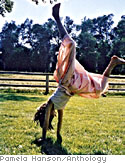
Old script: If I show you how much I love you, you'll leave me. New script: It ain't necessarily so. Cathleen Medwick talks with a legendary scholar who's rewritten the book on joy.
I come from a long line of women who see pleasure—delight in living and loving with all your heart—as dangerous, because it leaves you wide open to rejection. When I heard that Carol Gilligan was coming out with a book called The Birth of Pleasure (Knopf), I jumped for—well, whatever in my cautious and discreet nature passes for joy.In 1982 I had discovered Gilligan's In a Different Voice, a book that revolutionized contemporary thinking about women by showing how their concern with feelings and relationships (rather than with the rules that preoccupy men) was a strength, not a weakness. Gilligan's best-selling book, by setting up an alternative value system, gave women a voice and established the Harvard professor as an expert on women's culture. Over the next 20 years, while she and her husband were bringing up three sons, she co-wrote and co-edited five more books and spearheaded high-impact gender studies. Now she had something crucial to say about pleasure. I had to know what it was.
"Of course the script of the psychology of development has always been about separation," Gilligan tells me. "First comes love," she says, "then comes loss. First comes pleasure, then comes pain." It is a very old script, replayed again and again in our culture, in everything from ancient myths to modern novels, from opera to country music. As Gilligan writes, at the heart of this familiar, tragic story is always the question "If I love you, will you leave me? It is a child's question: Will you leave me, how will I survive?"
We are in her office at New York University, where she will officially join the full-time faculty in June. She is explaining how she discovered that at around age 10 or 11, girls begin building walls around themselves and retreating inside, losing their audacity and independence. They start dealing with their emerging identities by trying not to be too emotional, too sexual, "too much." It is what the culture expects them to do. I remember, I tell her, making a conscious decision to hide my feelings from my parents and friends, and later from boyfriends, who might disappear if they knew how much I cared for them.
"I remember doing that, too," Gilligan tells me. "It's a brilliant decision. It's an adaptation to reality that protects the self from being overwhelmed." The problem is that the decision is also devastating. It creates a "geological fault" in the psyche, so that our ability to take pleasure in life and love are muted and we develop a kind of double consciousness. "Do you want to know what I think?" a woman in Gilligan's study asked her, "Or do you want to know what I really think?"
That question hit her as a revelation. She began to wonder if boys, too, suffered a psychic disconnect, and found that it happened around the age of 5, as parents pulled away so that their sons would be less dependent, more "male." Talking with the fathers of preschoolers in the late nineties, she noticed the sadness of men remembering the joy they had muffled in themselves. And in her work with couples in therapy, she saw both men and women pushing away love, repeating the old tragic story as if that were their destiny.
What she was seeing, Gilligan realized, was a landscape of human unhappiness—a desert of the spirit where people were losing their way. "My wanting to write this book was partly wanting to give them a map," she tells me. "If we know when this [closing off] happens, then we can say, 'Does it have to happen?' And the answer is no." In the story of Psyche and Cupid—presented as "an old wife's tale" by Apuleius, from Northern Africa—a girl breaks a taboo by looking at the god of love, then pursuing him until he comes back to her. That story, Gilligan explains, maps the escape route from tragedy to joy: the refusal to give up on yourself and your heart's desire. "The crucial thing in any relationship is the ability to repair the inevitable breaks," Gilligan says. "That's the rhythm of relationship—finding, losing, and then finding again."
To go more deeply into what she had learned, Gilligan took a personal journey through her own past. In The Birth of Pleasure, she breaks her academic silence to speak to the reader in a different voice—intimate, brave, and brimming with love.
What she was seeing, Gilligan realized, was a landscape of human unhappiness—a desert of the spirit where people were losing their way. "My wanting to write this book was partly wanting to give them a map," she tells me. "If we know when this [closing off] happens, then we can say, 'Does it have to happen?' And the answer is no." In the story of Psyche and Cupid—presented as "an old wife's tale" by Apuleius, from Northern Africa—a girl breaks a taboo by looking at the god of love, then pursuing him until he comes back to her. That story, Gilligan explains, maps the escape route from tragedy to joy: the refusal to give up on yourself and your heart's desire. "The crucial thing in any relationship is the ability to repair the inevitable breaks," Gilligan says. "That's the rhythm of relationship—finding, losing, and then finding again."
To go more deeply into what she had learned, Gilligan took a personal journey through her own past. In The Birth of Pleasure, she breaks her academic silence to speak to the reader in a different voice—intimate, brave, and brimming with love.




